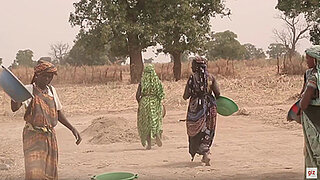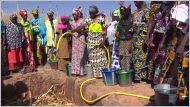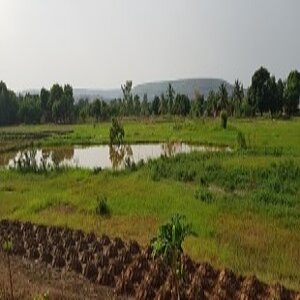Sheep and goats help after bad harvests

Rain becomes scarcer, and the fields carry less peanuts and millet. Farmer families in Mali are already clearly noticing the effects of global warming.
Rain becomes scarcer, and the fields carry less peanuts and millet. Farmer families in Mali are already clearly noticing the effects of global warming. Increasing drought is also a cause of conflict between pastoralists and farmers.
Woiri Diarra is a farmer. She sits in the shade of her house in the village of Didiéni in Mali, about 170 kilometres north of the capital Bamako. The earth is as dry as dust, the fields are left uncultivated. When she looks at how nature has evolved Diarra is worried. “This drought is a consequence of climate change,” says the mother of eight children firmly. She doesn't know her age, but she's probably in her late 40s. “Of course, I'm afraid of climate change. Very much so.”
Diarra has been observing for two decades how nature is changing - she can tell this from the yields of her fields, among other things. Diarra grows two hectares of peanuts, half a hectare of millet, as well as vegetables during the rainy season. 20 years ago, she would harvest 15 sacks of peanuts, today it’s only seven from the same fields, and she used to yield three sacks from the small millet field, now it’s only one.

Hartmut Behrend, head of the <link en nc details>Programme for the Support of the National Adaptation Strategy to Climate Change in Mali funded by the IKI and implemented by Deutsche Gesellschaft für Internationale Zusammenarbeit (GIZ) GmbH, confirms that the consequences of climate change can already clearly be seen in some parts of Mali. According to Mr. Behrend, the average temperature in Mali has risen by almost one degree Celsius since 1960 and the entire Sahel region has been suffering from severe droughts since the end of the 1960s. Rainfall fell by half until the mid-1980s. Although it has risen again since then, rainfalls have not returned to their previous levels, as he points out. In addition to this, rainfall has been fluctuating strongly since the 1980s and the availability of water is declining sharply.
The farmers must already bear the consequences of this evolution because extreme weather occurs more and more frequently. “The rainy seasons are much more irregular, heavy rains are more violent, floods are more severe, and the dry season lasts longer than before,” says Behrend. The results of this are dramatic: “The farmers become insecure, no one knows when to sow.”
Behrend is a climatologist who works for the German army and has been seconded to GIZ because of his special expertise. He has been dealing with the question of how climate change is linked to security for many years. NATO and the German government that has sent soldiers to Mali, are interested in the politically destabilising effects of climate change.
Being also a GIZ expert, Behrend has studied the connection between climate change and the increasingly frequent bloody clashes between farmers and pastoralists in the Sahel. He understands these clashes as conflicts about resources “that arise due to the increase in temperature, the low availability of water and the decline in food production”. The increasing drought drives the herds from the semi-arid regions of the Sahel more and more to the south, i.e. to those areas where arable farming is possible.
Pastoralists and farmers used to live there together during some time of the year in former times, but this was only after the harvest was brought in. Then, the animals were very welcome to the farmers, because they fertilized the fallow fields. Now, however, the pastoralists come with their herds, when the harvest is still in the fields. “The animals are feeding on the farmers’ harvests so that conflicts are bound to occur,” says Behrend. At the same time, the yields are declining which is also due to climate change. In addition to this, much more water evaporates into the air because of the rise in temperature.
Behrend believes, however, that the consequences of climate change account for only ten to twenty percent of the inter-ethnic conflicts. The strong population growth also plays an important role: when Mali became independent in 1960, it had four million inhabitants. Today it's around 18 million. Desertification and soil erosion are also factors that contribute to the emergence of conflicts.

Woiri Diarra is trying to grab a black and white sheep. The animal is shy, although it has already been with Woiri for several months now. She and seven other women in the village each received a sheep from the GIZ so that they could compensate for the significant crop shortfalls. The young animals can be sold when money is urgently needed. Among other things, this is intended to prevent people from raising money through illegal logging in times of need. Until now, the inhabitants of Didiéni have only heard from the news of conflicts in other parts of the country. They already receive support to prevent the worst from happening.
“Adaptation to climate change”, to which the project is dedicated, is largely about rediscovering old knowledge. One example of this is adapted agriculture: fields can be created in the shade of trees, so that the soil becomes less dry and the force of the wind is broken. Other means to adapt to climate change are stone walls against erosion, the distribution of climate-neutral stoves and similar measures.

Distributing sheep to the population helps to increase the income of the households. Diarra is happy about her sheep. Although her first lamb did not survive, Diarra now hopes for the next ones. She wants to sell the young animals because she needs the money: "I want all my children to get a good education." This is certainly a good idea to prevent any further violent conflicts.
The link has been copied to the clipboard
Contact
IKI Office
Zukunft – Umwelt – Gesellschaft (ZUG) gGmbH
Stresemannstraße 69-71
10963 Berlin









